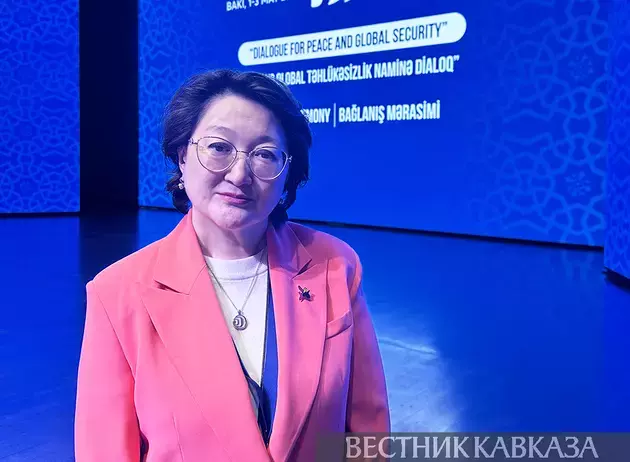The VI World Forum on Intercultural Dialogue ends in Baku. Representative delegations from over 110 countries, including Russia, took part in the event. Vestnik Kavkaza talked with the former Minister of Culture and Sports of Kazakhstan, President of the Turkic Culture and Heritage Foundation Aktota Raiymkulova about the results of the forum and the importance of intercultural dialogue.
- Aktoty Rakhmatullayevna, how do you assess the VI World Forum on Intercultural Dialogue in Baku?
- Holding this kind of event is a huge event not only for Azerbaijan, but also for the whole world. The problems stated and raised during the VI World Forum on Intercultural Dialogue and its theme - "Dialogue for Peace and Global Security: Cooperation and Interaction" - tune in for very serious reflection about today, about the prospects for the development and preservation of civilization, about the cultural heritage that we can keep. In addition to issues of preserving cultural heritage, environmental issues of climate change have also been discussed, which are also included in the set of tasks for the preservation of our civilization.
The opening of the forum and the speech of the respected President of Azerbaijan, Mr. Ilham Aliyev was particularly interesting. In his speech, he outlined the vectors along which the development of the entire conference took place. The points he announced were then discussed in all plenary sessions. I was pleased that the discussions were led by very significant presenters. The quality of the current forum was very, very high. The leadership of important international organizations working in the field of culture was present, including permanent representatives of UNESCO countries who participated in all panels.
- What discussions did you participate in?
One of the panel discussions in which I participated was called "How can we preserve cultural heritage in conflict and post-conflict conditions". This is a very important topic today against the backdrop of conflict situations ongoing in different parts of the world. When we talk about the preservation of our cultural heritage, we are talking not only about tangible and intangible monuments, but also about people. We discussed how it is possible to preserve people, their languages and cultures, shared experiences and posed problems. As a result, I think we have even more questions, and therefore, more goals for further work. This is necessary so that we can boldly step into the future, despite the challenges that arise almost daily.
It is not without reason that this forum has the words “intercultural” and “dialogue” in its title. And it is not surprising that a large event with a similar theme is taking place in Azerbaijan, which itself experienced the most difficult situation of the destruction of its cultural heritage during the Karabakh war. Today Baku raises big questions about the protection of culture and consults with us about the preservation of Azerbaijani cultural heritage in Karabakh.
- In your opinion, how much does the Turkic cultural heritage contribute to interaction between countries today?
- It seems to me that this is the most basic thing that unites the Turkic countries.
- Do you see Russia in this context?
- Yes, sure. We have a lot of Turkic peoples, fraternal peoples in Russia. Of course, Altai is the homeland of the Turks. For example, in Kazakhstan we have the epic “Alpamys” - it exists in Altai under the name "Alpamysh", and in Uzbekistan also under the name "Alpamysh". Our countries have a lot of common Turkic heritage.
For example, in June there will be an international gurama festival in Baku. Gurama is patchwork handicraft art. In Kazakhstan and Kyrgyzstan it is called "kurak", in Uzbekistan it is called "kurama", in Türkiye it is "kyrk-yama", which literally means "forty patches". The same sewing tradition exists in Russian Altai. It is this heritage that unites us, and not just as the past. These crafts continue to live. They are a living reminder that we have a common past, a common present and, I think, a common future.
The ideas of peace and preservation of heritage, preservation of languages and simply the lives of people unite us all, not only the Turkic peoples. It is very important for us that Russia participates in intercultural dialogue. These days I met with Mr. Mikhail Shvydkoy and the Minister of Culture, Mrs. Olga Lyubimova, and saw how much we have in common.
- How do you assess the role of culture in building positive relations in the world community and Azerbaijan's contribution to this task?
Since I am a person of culture, I am a musician, I understand that it is culture that serves as a unifying principle. For example, how can we say that Tchaikovsky is only a Russian composer? This is a global composer. The same applies to Liszt, Beethoven, Saint-Saёns, Kurmangazy Sagyrbayuly, Uzeyir Hajibeyov. Their works of art bring everyone together. In the same way, when ancient cultural monuments in Aleppo were destroyed, it was not only the civilization that developed in Syria that suffered, but universal human values.
Therefore, I think, the VI World Forum on Intercultural Dialogue in Baku has become a very good platform for discussion of today's important issues for progressive humanity, such as the preservation of cultural heritage. I want to wish this forum a wonderful future. I would like to congratulate the Ministry of Culture of Azerbaijan, responsible for the organization, on the very high level of the forum and on the selection of significant speakers and interesting topics. I think Baku has set an example of how to host major international events once again.






